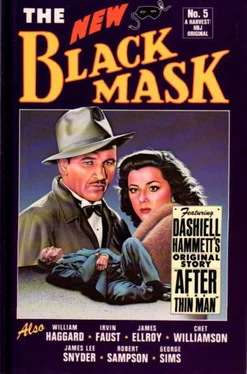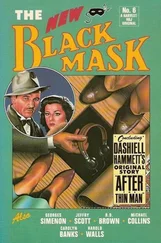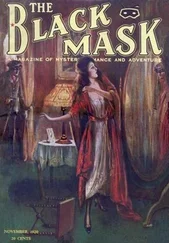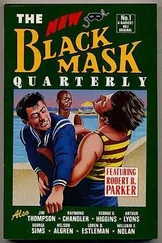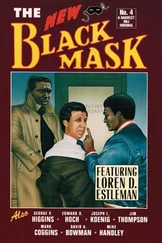William Haggard - The New Black Mask (No 5)
Здесь есть возможность читать онлайн «William Haggard - The New Black Mask (No 5)» весь текст электронной книги совершенно бесплатно (целиком полную версию без сокращений). В некоторых случаях можно слушать аудио, скачать через торрент в формате fb2 и присутствует краткое содержание. Год выпуска: 1986, ISBN: 1986, Издательство: A Harvest/HJB book Harcourt Brace Jovanovich, Жанр: Детектив, на английском языке. Описание произведения, (предисловие) а так же отзывы посетителей доступны на портале библиотеки ЛибКат.
- Название:The New Black Mask (No 5)
- Автор:
- Издательство:A Harvest/HJB book Harcourt Brace Jovanovich
- Жанр:
- Год:1986
- ISBN:9780156654845
- Рейтинг книги:4 / 5. Голосов: 1
-
Избранное:Добавить в избранное
- Отзывы:
-
Ваша оценка:
- 80
- 1
- 2
- 3
- 4
- 5
The New Black Mask (No 5): краткое содержание, описание и аннотация
Предлагаем к чтению аннотацию, описание, краткое содержание или предисловие (зависит от того, что написал сам автор книги «The New Black Mask (No 5)»). Если вы не нашли необходимую информацию о книге — напишите в комментариях, мы постараемся отыскать её.
The New Black Mask (No 5) — читать онлайн бесплатно полную книгу (весь текст) целиком
Ниже представлен текст книги, разбитый по страницам. Система сохранения места последней прочитанной страницы, позволяет с удобством читать онлайн бесплатно книгу «The New Black Mask (No 5)», без необходимости каждый раз заново искать на чём Вы остановились. Поставьте закладку, и сможете в любой момент перейти на страницу, на которой закончили чтение.
Интервал:
Закладка:
After inspecting the trails of wood chippings soaked in paraffin which he had laid throughout the cottage like long fuses leading to explosive charges, he glanced round the wildly overgrown plot that had once been a garden. Rank grass a foot high contended with massive clumps of nettles, giant docks, and cow parsley. He did not think that it would be possible to trace footprints on such a terrain, but also he did not expect his enterprise to be risk-free. There were bound to be risks in a life governed by mere chance.
It was 2:45 p.m. when he walked back through the wood to the narrow, twisting lane. He wore the rubber gloves; his left hand was in his old fishing-jacket pocket and the other was plunged into the haversack that hung from his right shoulder. He positioned himself in the lane so that he would be on the driver’s side of the van when it approached him. The oppressive mood which had dogged him for so many weeks had lifted, and he whistled as he waited — a rather tuneless version of “As Time Goes By,” which he repeated over and over again.
At 3 p.m. precisely he heard a motor engine in the lane and got ready to wave the van down if it was driven by Johnson. For the first time that afternoon excitement seized him, with a thumping of his heart and a sudden tremor of fear such as he had always experienced before hand-to-hand fighting in Korea. He had once said to another soldier there, “Everyone’s afraid at times. Anyone who says he isn’t is either a liar or a fool.”
As the post office van came round the comer, Patchin waved it down, first tentatively then more vigorously as he spotted Johnson’s head of black curly hair. Johnson stopped the van, rolled its window farther down, and called out, “What’s up?”
Patchin walked slowly across to the van, limping very slightly and holding himself as though he were in pain. “Sorry, sorry,” he said. “Bit of trouble.” He came close to the van door and stood silent, with his eyes half-closed and swaying slightly as though he were going to faint.
With a puzzled expression in which there was just the faintest hint of suspicion, Johnson opened the van door and began to get out — his height made doing so a rather awkward business. Patchin took out the iron pipe and hit Johnson on the head, a measured blow by someone who had considerable experience in stunning animals. Johnson lurched forward and then fell in a heap, just like a poleaxed bullock. Patchin bundled him back into the van, got into the driving seat, and drove off down the lane, whistling the same tune again. After a hundred yards he turned off onto a track which led in the direction of the gamekeeper’s cottage. Before leaving the red van he pressed Johnson’s fingers on the steering wheel, then bundled the body up and carried it on his shoulder as easily as he managed a side of beef.
He also paused in the decaying doorway to impress Johnson’s fingerprints on two empty paraffin cans, then carried him through to the kitchen. The tall man was still inert, but as Patchin dropped his burden onto the cement floor, Johnson’s eyelids flickered. Patchin sat him up like a ventriloquist’s dummy and then knocked him out with a blow to the jaw that would have floored most boxers.
Patchin put sticky plasters over Johnson’s large mouth, then worked on the unconscious man with the skill he always showed in preparing joints. He put his legs neatly together and bound them tightly from above the knee to the ankles, using the same binding technique he used in repairing his fishing rod, pulling the cord so tight that the legs became immobile; he left a loop by the ankles. He repeated the process with the limp arms. Then came the part that gave him most satisfaction: lifting the two loops onto the hooks that had once supported a turnspit in front of the fire. Immediately after Johnson was suspended like an animal carcase ready to be roasted, Patchin lit the fire in the grate and left the cottage.
Before taking off his rubber gloves, Patchin picked up the empty paraffin cans and left them near the old garden gate, which was half hanging off its hinges, then strode off to the place where he had hidden his own van. The time was 3:30, and everything had gone exactly as he had hoped. There was always blind chance of course, for instance, the remote possibility that another pair of lovers might be trespassing in the woods and see him striding along so purposefully, but there was nothing he could do about it.
Driving to the Thames, Patchin mentally examined his plan again and formulated one or two more things to be done. As soon as he had parked the van near Hambleden Mill, he assembled his rod and line right down to putting on the bait, a thing he never did till he was actually on the riverbank, so that anyone seeing him might think he had already been fishing and was trying another spot. Then, carrying the assembled rod, he walked along a gravel path and over the complicated series of weirs which cross the Thames at Hambleden Mill. As he approached the lock, he watched to see whether the keeper there might be in sight and was relieved to be able to cross unseen.
Patchin threw his piece of iron pipe into the river before spending an hour angling. He fished like a young boy, close-in to the bank where there were more bites to be had but the fish were always small. He caught a tiny roach and three gudgeon but was quite satisfied with them, leaving the last gudgeon on the hook as he walked back to the lock. Good fortune was still with him, for the lockkeeper was now at work opening the gates for a motor cruiser. The keeper, who knew Patchin well, called out, “Any luck, Dan?”
“Not much. Just tiddlers,” Patchin called out, shaking his rod so that the suspended gudgeon twisted about at the end of the line. “Think I’ll use them to try for a pike in the pool by the mill. See you.”
"Yes, see you. Will you keep me a nice small chicken for the weekend?”
“Yes. Right.” Patchin walked off just fractionally quicker than he did normally. With excitement working in him at the prospect of revisiting Ames’s cottage, it was not easy to appear just as usual. For once he was grateful that he had a rather expressionless face.
His mind on other things, he mechanically dismantled the fishing rod and line as quickly as he could. “Yes, all going to plan,” he said aloud, though there was no one within a hundred yards of him.
Driving back to the lane once more he experienced a surprising feeling of letdown and anticlimax. It was true that it had all gone without a hitch as far as he could tell, but somehow it seemed a bit too easy. There would have been more satisfaction if he could have allowed the tall but puny Johnson a chance to fight, some ludicrous attempt at self-defence which he would have brushed away derisively, as easily as a tomcat deals with a rat.
Once in Calcot Wood again, Patchin’s nose twitched. There was a faint aroma like that of roast pork which had greeted him at lunchtime at Pound Cottage. It grew stronger at every step he took. Desultory grey fumes struggled up from the ancient chimney. The smell was very strong in the hall and unpleasantly so in the kitchen, which reeked of cooking odours and where a blackened, twisted carcase was still roasting and dripping fat into a dying fire.
Despite the smell, Patchin stayed there looking at the object, which bore no resemblance to the once garrulous postman. Patchin’s hatred of the man had quite disappeared now that there was no longer any need for it. He was not gloating over his victim but musing on the quintessential evanescence of man. How easily was man humbled, how soon was he changed into rotting meat! It had been just the same in Korea: one minute his friend Dusty Seddon had been telling a dirty joke, the next moment lying mute with most of his face blown off.
Читать дальшеИнтервал:
Закладка:
Похожие книги на «The New Black Mask (No 5)»
Представляем Вашему вниманию похожие книги на «The New Black Mask (No 5)» списком для выбора. Мы отобрали схожую по названию и смыслу литературу в надежде предоставить читателям больше вариантов отыскать новые, интересные, ещё непрочитанные произведения.
Обсуждение, отзывы о книге «The New Black Mask (No 5)» и просто собственные мнения читателей. Оставьте ваши комментарии, напишите, что Вы думаете о произведении, его смысле или главных героях. Укажите что конкретно понравилось, а что нет, и почему Вы так считаете.
